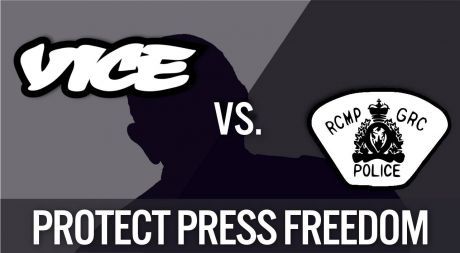News
You are here
Protect press freedom

February 8, 2017
February 6 was Ben Makuch's final day at the Ontario Court of Appeal at Osgoode Hall in Toronto. He is a VICE News journalist who the Canadian government, specifically the RCMP, has been pressuring into releasing private chat logs between himself and a source.
The Case
Makuch’s source allegedly left Canada to join ISIS and has since been charged with terrorism after issuing threats to Canada and the US. The government's lawyers have argued the lower court’s demand that Makuch release his logs rightly balanced the role of the free press and the needs of law enforcement, and do not have a chilling effect.
The Crown also advanced the argument that because there is no alternative source for the information in these chat logs besides Mr. Makuch's screenshots of them, they should be given over to the government for the criminal trial against Mr. Shirdon. The Canadian Civil Liberties Association argued that evidence is readily available online—through the published information—and the chat logs are unnecessary. Indeed, the government built a case against Shirdon without any of Makuch's notes.
To this, the Crown argued that things can be taken down from the internet and tweets can be deleted. Crown attorney Sarah Shaikh said this was partly, “from my own personal experience with Twitter itself”. But this is simply not the case: tweets and statements online can be deleted after posting, but this does not mean they are erased from every corner of the web. It is unreasonable to argue to that deletion capabilities of news sites and Twitter account holders are good reason to compel journalists to turn over their sources and notes.
The consequences
The implications for press freedom are potentially severe. There is of course the chilling effect on freedom of speech and the free press, which two of the government's lawyers said repeatedly they were prepared to accept. Without the assurance that journalists can protect their sources and their notes, fewer people will come forward to provide accounts and documentation of dangerous abuses of state and corporate power.
A ruling against Makuch and Vice would also turn journalists doing their jobs into either antagonists of law enforcement, or third parties acting as pseudo-detectives for the police. Neither of these is an appropriate role for the press.
The RCMP itself has a very spotty history of actually behaving responsibly with newfound powers. At one point they held detailed files on one in 28 Canadians, roughly 800,000 people. These were ordered destroyed when CSIS was created to take over the RCMP Security Services' responsibilities. The ability to compel reporters to turn over sources and notes for trials amounts to a new repressive state power. Courts need to be ever-cautious when granting law enforcement new tools, especially those that wade into free press issues.
Protect press freedom
Makuch and Vice Media Canada have been fighting this court order by a lower court in Ontario. On February 6 a coalition of supporting legal organizations including the British Columbia Civil Liberties Association (BCCLA) and the Canadian Civil Liberties Association (CCLA) acted as interveners in court to advance legal arguments for Makuch, Vice, and press freedom.
Outside the courthouse the Canadian Journalists for Free Expression (CJFE) organized a rally. After the hearing I spoke with one of the lawyers with the coalition of interveners backing Makuch and Vice. He said the general timeline for these rulings is six months, although they may take more or less time. This is a crucial flashpoint for press freedom and protecting journalism.
*Join the February 25 “Trudeau we’re watching you” day of action against surveillance and for press freedom
Section:
Topics:









